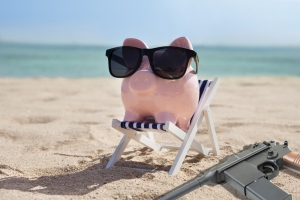 Guns and Deck Chairs by David Rhodes
Guns and Deck Chairs by David Rhodes
The prize for the world’s worst Christmas card must surely have been won by a United States congresswoman.
The card showed her in a family group with her husband and children. What made the picture shocking was that each person on the card – children included – was holding a gun.
The weapons Americans buy to keep themselves safe are the reason so many people are at risk of violent death.
In Britain, too, the latest political buzz-word is ‘security’. We must keep ourselves safe from terrorists and protect our way of life from foreign migrants, say the Government.
We prefer not to ask why people resort to violence or turn up half drowned on the shores of Europe. So far we have got away with looking the other way. Not any longer.
The realisation is beginning to dawn that actions often have unintended consequences. One reason there are so many Syrian refugees is that some years ago their harvests failed after exceptionally bad weather. The resulting political unrest triggered the civil war.
The cause of the massive crop failure was attributed to climate change.
Imagine what will happen to national borders and national security, if not just a few million but hundreds of millions of people are displaced by global warming and plunged into absolute poverty.
Recent flooding in Leeds and other British towns and cities has also been blamed on climate change. And more may be on the way. Dredging rivers and higher flood defences will not be enough. It’s a bit like rearranging the deck chairs on the Titanic.
So is anyone really going to tackle global warming?
Vested commercial interests suggest short-term gain will remain the controlling priority. Meanwhile the human race is on a collision course with its best friend: the planet.
What is it that drives multi-national corporations to rip up millions of acres of rain forest and pollute the atmosphere? The obvious answer is greed: but what, in turn, is the cause of that greed?
Maybe what’s causing it is the same thing that makes Americans buy guns. Fear.
Fear of a threat to wealth, status and power.
It’s no coincidence that the words spoken most often by Jesus were: Do not be afraid. He was probably talking to his disciples: urging them to have courage in the face of persecution. But why would they be in danger of persecution – and by whom? The only people doing persecution were the Romans.
Why would people who followed Jesus’ agenda be in danger from them? Unless what they were doing and saying in some way threatened the political and economic vested interests of Rome? Which it did.
Things are not very different today. Except that time is running out for us all. Climate change is already happening.
Suddenly the words ‘love your neighbour’ have a radically deeper significance. In the past the Church has been good at responding to situations of local poverty and need. Food banks and hospitality to refugees in Leeds and other cities bears witness to that.
What the Church has not been good at is challenging the causes of poverty. Sticking its head above the political parapet and daring to confront the powerful.
That takes courage. Maybe one reason it does not engage effectively with the causes of poverty and injustice is the fear that it might be attacked for doing so. When the Faith in City report came out, years ago, it was attacked by the Government for being Marxist. It was a shot across the bows from the powerful.
So where is God in all this? Is s/he going to let the human race plunge itself into chaos?
The struggle for justice requires a strong faith. And it is not always clear that the faith of the Church is strong when it comes to social action. Nor is it clear what sort of God it really believes in.
That’s why this year’s LCI Lent course will be exploring huge questions about the nature of God – and about poverty, fear and greed.
And looking at how the Churches in Leeds and beyond can respond effectively and urgently to the greatest threat there’s ever been to human survival. The climate.
